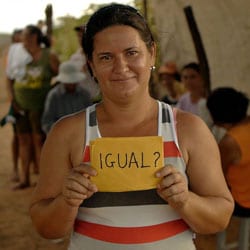Gender equality in Latin America: creating policy environments that achieve success
By zclef78, on 12 March 2014
“The message of gender equality still resonates over a century after it was first proposed by the revolutionary Clara Zetkin.”
One of the opening statements of Professor Maxine Molyneux’s Lunch Hour Lecture reminded us that with International Women’s Day on 8 March, it was the perfect time to consider what has been achieved by the UN Millennium Development Goal to “promote gender equality and empower women” since the year 2000.
Few people in the UK have heard of the Millennium Development Goals (MDGs), and only about a third of the audience today.
This was a good proportion according to Professor Molyneux (Institute of the Americas), despite our very own David Cameron co-chairing the UN panel responsible for the post-2015 agenda for development goals – a fact that amused some members of the audience (perhaps thinking of recent criticisms about the all-male Tory front bench).
But with the democratic representation of women in the UK at only 22% compared with Latin America’s average of 25%, and our mediocre ranking of 26 on the Gender Inequality Index, perhaps we should be paying a bit more attention.
 Close
Close





